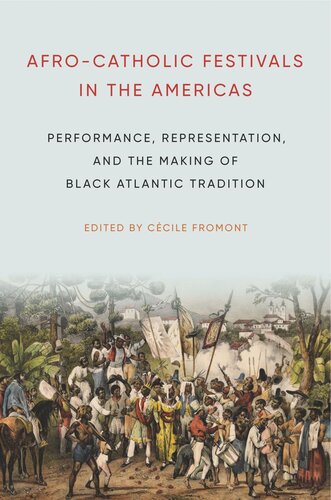

Most ebook files are in PDF format, so you can easily read them using various software such as Foxit Reader or directly on the Google Chrome browser.
Some ebook files are released by publishers in other formats such as .awz, .mobi, .epub, .fb2, etc. You may need to install specific software to read these formats on mobile/PC, such as Calibre.
Please read the tutorial at this link: https://ebookbell.com/faq
We offer FREE conversion to the popular formats you request; however, this may take some time. Therefore, right after payment, please email us, and we will try to provide the service as quickly as possible.
For some exceptional file formats or broken links (if any), please refrain from opening any disputes. Instead, email us first, and we will try to assist within a maximum of 6 hours.
EbookBell Team

0.0
0 reviewsThis volume demonstrates how, from the beginning of the Atlantic slave trade, enslaved and free Africans in the Americas used Catholicism and Christian-derived celebrations as spaces for autonomous cultural expression, social organization, and political empowerment. Their appropriation of Catholic-based celebrations calls into question the long-held idea that Africans and their descendants in the diaspora either resignedly accepted Christianity or else transformed its religious rituals into syncretic objects of stealthy resistance.
In cities and on plantations throughout the Americas, men and women of African birth or descent staged mock battles against heathens, elected Christian queens and kings with great pageantry, and gathered in festive rituals to express their devotion to saints. Many of these traditions endure in the twenty-first century. The contributors to this volume draw connections between these Afro-Catholic festivals—observed from North America to South America and the Caribbean—and their precedents in the early modern kingdom of Kongo, one of the main regions of origin of men and women enslaved in the New World. This transatlantic perspective offers a useful counterpoint to the Yoruba focus prevailing in studies of African diasporic religions and reveals how Kongo-infused Catholicism constituted a site for the formation of black Atlantic tradition.
Afro-Catholic Festivals in the Americas complicates the notion of Christianity as a European tool of domination and enhances our comprehension of the formation and trajectory of black religious culture on the American continent. It will be of great interest to scholars of African diaspora, religion, Christianity, and performance.
In addition to the editor, the contributors include Kevin Dawson, Jeroen Dewulf, Junia Ferreira Furtado, Michael Iyanaga, Dianne M. Stewart, Miguel A. Valerio, and Lisa Voigt.